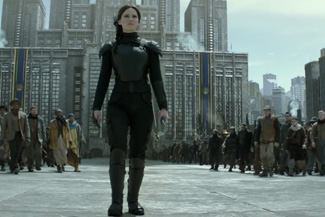Movie Review - The Hunger Games: Mockingjay Part 2
By Matthew Huntley
November 23, 2015
BoxOfficeProphets.com

Alas, while watching Mockingjay - Part 2, my curiosity and excitement tapered, and even though this fourth and final chapter isn't exactly a letdown, it's also not as compelling as its predecessors. Perhaps this was inevitable since the studio chose to break up Suzanne Collins' last novel into two different films, which Hollywood too often does with young adult fiction (Harry Potter, Twilight and Divergent have and will follow the same trend). This approach may make sense from a box office point of view, since fans of such a popular brand seem willing to pay for any number of installments Hollywood throws at them, but not from a narrative one, not in this case anyway. I'm sure everything, or mostly everything, that happens in Part 2 also happened in Collins' book (I've yet to read any of them), but from a cinematic standpoint, the filmmakers have spread the events and underlying conflicts too far out and too thin, which causes Mockingjay - Part 2 to drag a bit. Instead of being a thrilling conclusion, it's merely a conclusion.
The story picks up immediately where Part 1 left off, which, if you recall, ended with Katniss Everdeen (Jennifer Lawrence), the series' strong-willed and formidable heroine, being attacked by her beloved Peeta (Josh Hutcherson), who was recently rescued from the autocratic Capitol government and its insidious leader, President Snow (Donald Sutherland). If you're at all familiar with The Hunger Games universe, then you already know the context in which we know these characters and what they've been through up until now. If not, all you need to know going into Part 2 is that the story takes place in a dystopian future where there's only one remaining country, Panem, which the despotic Capitol has divided into 12 districts. Every year, as a way to maintain control over its citizenry, the Capitol randomly chooses two members from each district to take part in The Hunger Games, an event in which the participants must hunt and kill one another.
Katniss and Peeta interrupted this tradition by refusing to off each other and, in the process, fell in love (though they still haven't officially declared their romantic intentions). Eventually, the Capitol captured Peeta and brainwashed him, making him susceptible to violent outbursts and unaware of who he really is, let alone who his compatriot rebels are, including Katniss.
Upon seeing what the government has done to him, Katniss tells the president of the rebellious District 13, Alma Coin (Julianne Moore), that she will do whatever it takes to help take down the Capitol. She wants to function as more than just a symbol for the revolution. But because Coin sees Katniss as a potential threat to her own power, she denies her permission to take part in an upcoming raid on the Capitol's headquarters in District 2. But with Katniss being Katniss, who always manages to “make things difficult” according to her mentor, Haymitch (Woody Harrelson), she sneaks off to District 2 anyway, where she joins Gale (Liam Hemsworth), the third side in her and Peeta's love triangle, and other rebel soldiers in their quest to usurp the government.
From here, the movie more or less settles into a series of standard action/special effects scenes followed by quieter moments of reflection as the rebels dodge one booby trap after another. The bulk of the runtime revolves around three major sequences like this, which makes Part 2 feel redundant as it trudges toward its climax and the screenplay finally answers the questions we've been asking since the first film: will Katniss get the chance to carry out her revenge and assassinate Snow; will she secure peace and freedom for all the citizens of Panem; and whom will she choose as her romantic partner, Peeta or Gale?
I'll not reveal any of these answers, of course, but as the movie plods along, we become less concerned about them because we realize, after a while, Part 2 probably won't generate any real surprises. The result is a film that satisfies us on a completionist level and only mildly on an emotional one, thanks especially to the genuine performances from Lawrence and Hutcherson, both of whom are so good and natural on-screen they'll likely avoid being typecast in future roles (Lawrence has already proven herself a versatile actress outside of a major franchise like this).
Ultimately, Part 2 simply didn't light a strong enough fire under me to recommend it. I appreciated its action, drama and production design (the filmmakers have spared no expense with regards to the special effects and creating an effectively bleak atmosphere), but narratively, it plays out like a standard denouement. Whereas the earlier films seemed more progressive, daring and interesting, Part 2 heads toward a foregone conclusion. The screenplay seems to introduce new conflicts for new conflict's sake and not because they play any real role in developing the story or characters, and it spreads these out over two hours and 17 minutes. Without anything terribly intriguing happening on-screen, I kept thinking the filmmakers should have added another act to Part 1 and scratched this installment altogether.
Still, these criticisms hardly make the final Hunger Games a bad movie, but it is, unfortunately, a rather uninspired one. Fans of the series, both the books and the films, won't be disappointed necessarily, just underwhelmed. I was hoping the finale would cap the series off in such a way we weren't expecting or haven't seen before, even if Collins' novel didn't, but that's probably one of the prices of bringing such a popular entity to the big screen. However, just like the characters in these movies disrupt the status quo, hopefully future filmmakers will do the same thing when it comes to adapting the next young adult series. I'm sure there will be plenty to choose from.